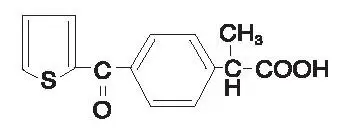Profenal - Clinical Pharmacology
Suprofen is one of a series of phenylalkanoic acids that have shown analgesic, antipyretic, and anti-inflammatory activity in animal inflammatory diseases. Its mechanism of action is believed to be through inhibition of the cyclooxygenase enzyme that is essential in the biosynthesis of prostaglandins.
Prostaglandins have been shown in many animal models to be mediators of certain kinds of intraocular inflammation. In studies performed on animal eyes, prostaglandins have been shown to produce disruption of the blood-aqueous humor barrier, vasodilatation, increased vascular permeability, leukocytosis, and increased intraocular pressure.
Prostaglandins appear to play a role in the miotic response produced during ocular surgery by constricting the iris sphincter independently of cholinergic mechanisms. In clinical studies, PROFENAL has been shown to inhibit the miosis induced during the course of cataract surgery. PROFENAL could possibly interfere with the miotic effect of intraoperatively administered acetylcholine chloride.
Results from clinical studies indicate that PROFENAL Ophthalmic Solution has no significant effect on intraocular pressure.
There are no data available on the systemic absorption of ocularly applied suprofen. The oral dose of suprofen is 200 mg every four to six hours. If PROFENAL 1% Ophthalmic Solution is applied as two drops (1 mg suprofen) to one eye five times on the day prior to surgery and three times on the day of surgery, the total applied dose over the two days would be about 25 times less than a single 200 mg oral dose.






